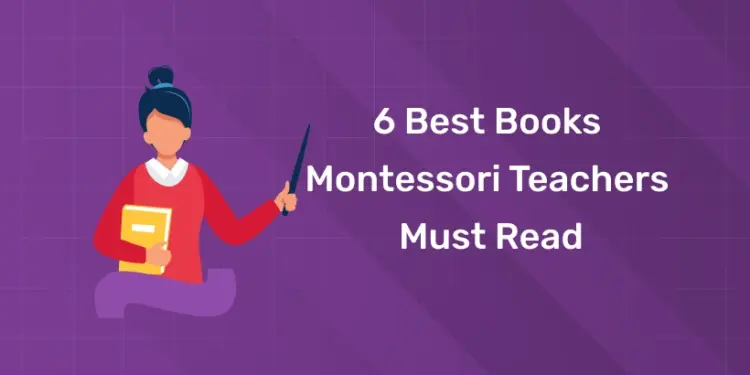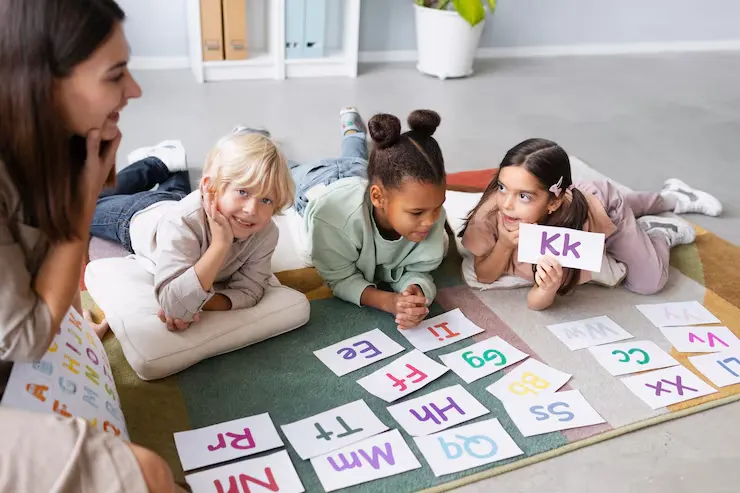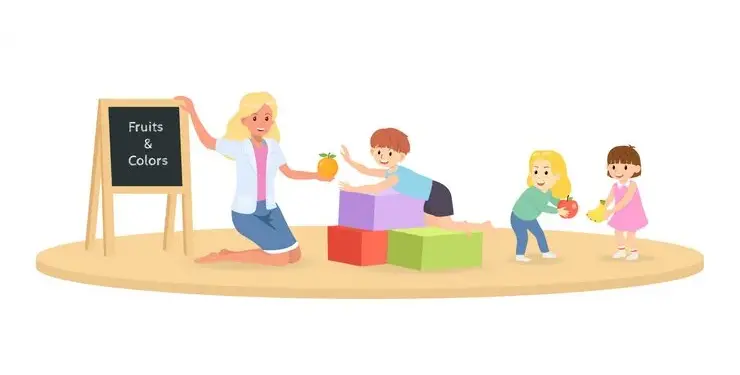Table of Contents
If you are looking to becoming a prominent, organized Montessori guide, and also need to create smooth and very successful Montessori days, then you are at the right place. In this article, we venture in to a journey through the pages of some of the best books that every Montessori teachers should explore and succeeded. These books provide priceless insights, useful techniques, and inspiration to improve our practice and broaden our understanding of Montessori principles. They range from timeless classics by Maria Montessori herself to more recent manuals written by renowned educators and practitioners.
Start now to become a certified Montessori teacher! Get free Demo Here!
Best Books for Montessori Teachers
The cornerstones of Montessori education are observation, investigation, and cultivating a love of learning. Examining the extensive literature that surrounds this instruction as a Montessori teacher is crucial to developing comprehension and improving methods. The following is a carefully selected list of literature that all Montessori teachers ought to read:
1. The Montessori Method by Maria Montessori:
The Montessori Method by Maria Montessori play key role in the field of Montessori education. And this book was first published in 1912. Maria Montessori, an Italian physician and educator, she outlines her comprehensive outlook to teaching and learning in this innovative book. She determines her observations of children in her Children’s House in Rome. Montessori presents an approach that will make significant on children’s natural development. Its range falls under spontaneous abilities, independence, and freedom within the limit.
The Montessori Method: Values Provides
- The educational philosophy of Montessori, which is described on respect for the child as an individual with their unique capabilities and needs, is explained well in this book along with its guiding principles and methods.
- She promotes for the how could maintain carefully prepared environments that will encourage independent learning, discovery, and exploration.
- Additionally, Montessori also addresses the role of the teacher as a facilitator who as opposed to imposing curriculum, leads and encourages the child’s learning journey.
- The book “The Montessori Method” covers numerous topics, such as the value of sensory materials, the development of useful life skills, the growth of language and literacy, and the development of mathematical comprehension.
- The way we comprehend and approach teaching and learning has been greatly influenced by Montessori’s discoveries into child psychology, which have had a global impact on educational practices.
2. The Absorbent Mind by Maria Montessori:
“The Absorbent Mind” Montessori book by Maria Montessori is a ground-breaking passion for teaching. And it was published in 1949.In the entire book, Montessori explains the idea of the absorbent mind. A special and influential stage of early childhood development when kids easily absorb information from their surroundings.
According to Montessori teaching, children have a special mental capacity known as the absorbent mind that will allow them to absorb information spontaneously and experiences without any explicit instruction or purposeful effort. She notes that children’s exceptional capacity to learn and adjust to their surroundings throughout the first six years of life lays the groundwork for later intellectual, emotional, and social development.
The Absorbent Mind: Values Provides
- In “The Absorbent Mind,” Montessori delves into the qualities of a child’s absorbent mind, encompassing its heightened sensitivity to stimuli.
- Discusses the ability for impromptu learning and its significance in shaping children’s personalities and developmental stages.
- The book also discusses how important it is for the environment to stimulate the inquisitive mind of youngsters by offering rich and rejuvenating experiences that bolster their natural curiosity and learning.
- In order to show how the ideas of the absorbent mind affect every stage of early childhood development, Montessori provides observations of children in their learning environments throughout the book.
- They talk on the significance of creating a conducive learning environment that offers chances for practical investigation, deliberate activity, and significant interaction.
3. Montessori, A Modern Approach by Paula Polk Lillard:
For understanding and implementing the Montessori method in the modern educational system ,”Montessori: A Modern Approach” by Paula Polk Lillard is an effective guide. Book was published in 1972 and revised in subsequent editions. This book will offer latest perspective on the author Maria Montessori’s ground-breaking approach to the education.
In “Montessori: A Modern Approach,” author provides an in-depth exploration of the fundamental principles of Montessori education, including the significance of setting up prepared environments, encouraging independence and self-directed learning, and honouring each child’s individual developmental stage.
Montessori, A Modern Approach: Values Provides
- Throughout the book, author examines the key components of the Montessori method. This includes the use of specially designed materials, the role of the teacher as a guide to help them, and the prominence in experienced learning.
- She also discusses the benefits of Montessori education for toddler of all ages, from infancy through the adolescence.
- And this book will addresses the common misunderstanding and challenges faced by the educators and parents.
- The book “Montessori, A Modern Approach” is honoured for its convenient writing style. It also has a thorough out the research, and balanced approaches to presenting Montessori philosophy and practices. If you’re a parent exploring educational options for your child, or simply curious about the Montessori method.
- This book will served as a valuable resource for understanding the principles and practical applications of Montessori education in today’s world.
Be a CEED International certified Montessori teacher! Join Now!
4. Dr. Montessori’s own Hand book by Maria Montessori
Author Maria Montessori’s other published one is “Dr. Montessori’s Own Handbook”. It is a concise yet comprehensive guide to her educational philosophy and method. This handbook refines the Maria Montessori’s initiated work into a realistic asset for parents, teachers, and educators. She discusses the importance of setting up a space that is conducive to learning, with carefully selected materials and activities that stimulate children’s interest and need to explore.
Dr. Montessori’s own Hand book: Values Provides
- The handbook offers detailed instructions for setting up a Montessori classroom or learning environment at home.
- Montessori emphasizes the role of the teacher as a guide, encouraging adults to observe children closely and respond to their unique needs and interests.
- Montessori provides ideas on language acquisition, practical life skills development, and child development throughout the book.
- She discusses the importance of establishing independence, self-control, and a love of learning from a young age, laying the foundation for lifelong intellectual and emotional development.
- The book honoured for its clarity, relevance and timeless relevance. Whether you’re a parent looking to support your child’s development at home or a teacher trying to include Montessori concepts in the classroom.
5. How to Raise an Amazing Child the Montessori Way by Tim Seldin:
“How to Raise an Amazing Child the Montessori Way” by Tim Seldin is a practical guidebook for parents and caregivers seeking to apply Montessori principles in raising and educating children. Published in 2006, this book offers a contemporary perspective on Maria Montessori’s educational philosophy and provides actionable strategies for implementing Montessori principles at home.
How to Raise an Amazing Child the Montessori Way: Values Provides
- The entire book will explain the importance of creating a good and stimulating environment that supports children’s natural brain development and skill development Also book detailed on intakes independence, creativity, and their life long love of learning.
- And the book covers a wide range of topics, including setting up a Montessori-inspired home environment, selecting an appropriate playing and materials for their needs, and encouraging the child’s autonomy and self-expression.
- Author Seldin also provides practical advice on promoting language and literacy skills on early age, mainly focused on social-emotional development, and supporting children’s physical and initiative growth.
- Throughout the book, Seldin was sharing the real-life examples and insights from his considerable experience working with children and families in Montessori school settings.
- In his book, he offers actionable tips and strategies for addressing common parenting challenges and encourages parents to adopt the principles of respect, patience, and observation in their interactions with their children.
6. The Secret of Childhood by Maria Montessori:
The Secret of Childhood is a comprehensive examination of child development and education. It is written by Dr. Maria Montessori, the educator responsible for creating the Montessori method. The 1936 book offers Montessori’s perceptions into children’s inner lives. And also the essential ideas that direct their development and education.
Montessori uses her observations and experiences working with children from a variety of backgrounds. With this she explores several facets of child development in her book. She delves into a child’s innate inclinations and vulnerable times. Along with that the significance of creating an atmosphere that fosters their natural curiosity to learn and explore.
The Secret of Childhood: Values Provides
- One of the book’s main themes is the idea of the “secret” of childhood, which is attributed to Montessori and is based on appreciating and respecting each child’s individuality.
- She stresses how important it is to treat kids like unique people with unique interests, skills, and developmental schedules.
- Montessori also addresses how adults, especially parents and teachers, should support children’s best possible growth. She is a supporter of an adult-child partnership built on mutual respect, trust, and support. This is as opposed to dictatorial control or overbearing intervention.
- In order to make her concepts understandable and applicable to readers, Montessori uses case studies, anecdotes, and real-world. These are backed by examples to explain her arguments throughout the book.
- She talks about how language, motor, and social abilities develop in children as well as the value of freedom, order, and discipline in the home.
- “The Secret of Childhood” provides significant insights into the nature of childhood and the tenets of Montessori education. It is still a priceless tool for parents, teachers, and everyone else who wants to recognise and develop a child’s potential.
Conclusion
1: What is the primary focus of the first plane of development in the Montessori method?
This blog reminds us of the significant influence that literature may have on our practice, our viewpoint, and our enthusiasm for teaching. This happens by the end of our journey through the necessary reading list for Montessori instructors. Every book discussed here serves as a lighthouse of knowledge and a growth accelerator for us as we strive to become the best Montessori teachers we can be.
May these books operate as beacons of light, illuminating our way and enhancing our work. This comes in handy we continue to foster the mental and emotional development of the kids at our care. As we embrace the transforming potential of Montessori education, see that all this motivates us with the ageless wisdom found in these priceless materials.
Register for the Entri Elevate Montessori Teacher Training Program! Click here to join!
Get Certified & Start Your Montessori Career
Montessori Teacher Training Course by Entri App: Gain expert skills, earn certification, and kickstart your teaching career.
Join Now!Frequently Asked Questions
Which Montessori book should a montessori teacher read first?
‘The Montessori system’, the founding text of the system, is a vital resource for educators. It offers instructions on how to apply the technique in the classroom as well as an outline of the underlying concept and principles.
What a Montessori teacher should know?
Montessori teachers could become effective educators by following these tips:
- Recognise the principles of the Montessori method.
- “>Develop your knowledge about child development.
- Possess strong classroom management skills.
- Capability to evaluate the learning of students.
- Possess strong communication skills with coworkers, parents, and students.
Why books are very important for Montessori teacher?
Better language skills: Reading to young children on a daily basis can aid in their language acquisition and literacy development, according to Montessori San Dimas CA. Reading helps kids develop their language, literacy, and social abilities by activating the area of the brain responsible for meaning comprehension.
Can you teach Montessori at home?
Making a learning area at home is simple when you use Montessori principles and a lot of the items you already own. Establish a special area for kids to learn away from home, if space permits.













